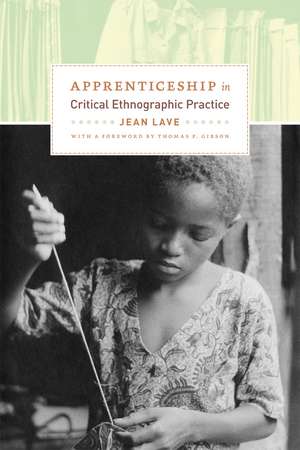Apprenticeship in Critical Ethnographic Practice: Lewis Henry Morgan Lecture Series
Autor Jean Laveen Limba Engleză Paperback – 30 apr 2011
As ethnography takes on increasing significance to an ever widening field of thinkers on topics from education to ecology, this erudite but accessible book will be essential to anyone tackling the question of what it means to undertake critical and conceptually challenging fieldwork. Apprenticeship in Critical Ethnographic Practice explains how to seriously explore what it means to be human in a complex world—and why it is so important.
Preț: 285.15 lei
Nou
Puncte Express: 428
Preț estimativ în valută:
54.56€ • 59.51$ • 46.01£
54.56€ • 59.51$ • 46.01£
Carte tipărită la comandă
Livrare economică 24 aprilie-08 mai
Preluare comenzi: 021 569.72.76
Specificații
ISBN-13: 9780226470726
ISBN-10: 0226470725
Pagini: 216
Ilustrații: 5 halftones, 2 maps, 3 line drawings, 4 tables
Dimensiuni: 152 x 229 x 15 mm
Greutate: 0.29 kg
Editura: University of Chicago Press
Colecția University of Chicago Press
Seria Lewis Henry Morgan Lecture Series
ISBN-10: 0226470725
Pagini: 216
Ilustrații: 5 halftones, 2 maps, 3 line drawings, 4 tables
Dimensiuni: 152 x 229 x 15 mm
Greutate: 0.29 kg
Editura: University of Chicago Press
Colecția University of Chicago Press
Seria Lewis Henry Morgan Lecture Series
Notă biografică
Jean Lave is professor emerita at the University of California, Berkeley, affiliated with the Departments of Anthropology, Geography, and Education. She is the author or editor of many books, including Cognition in Practice: Mind, Mathematics, and Culture in Everyday Life.
Cuprins
Foreword by Thomas P. Gibson
Acknowledgments
1 Introduction: Apprenticeship and Critical Practice
2 Institutional Arrangements and the Uniform
3 Becoming a Tailor
4 Testing Learning Transfer
5 Multiplying Situations
6 Research on Apprenticeship, Research as Apprenticeship
Notes
References
Index
Acknowledgments
1 Introduction: Apprenticeship and Critical Practice
2 Institutional Arrangements and the Uniform
3 Becoming a Tailor
4 Testing Learning Transfer
5 Multiplying Situations
6 Research on Apprenticeship, Research as Apprenticeship
Notes
References
Index
Recenzii
“This complex but lucid decoction of the study of learning is an ethnographic Bildungsroman. . . . Breaking free of binary positivism, [Jean] Lave shows, reveals the contextual and artisanal nature of what are ostensibly the most formal kinds of social and even intellectual activity. Her exercise in theoretical self-liberation documents an apprenticeship through which she learned from her discomfort with the inadequacies of experimental methods to appreciate the more nuanced possibilities offered by ethnography. . . . Her own book, long in the writing but pleasurably concise in the reading, represents a new high point in the long and distinguished history of the Morgan Lecture series.”
“It is a transforming process in itself to read this compelling book addressing research on apprenticeship and research as apprenticeship. Professor emerita Jean Lave invites us to all the corners of her tireless search for alternative approaches to cross cultural research on education. Among the tailors and their apprentices in Happy Corner, Monrovia, Liberia, we find the empirical and theoretical challenges that, in a delicately interwoven story, lead up to the final argument for a more adequate theoretical basis for future research: a theory of social practice, based on ethnographic-practical accounts that change theoretical concerns. Or, in other words, a suggestion for how it is possible to reach alternative conclusions, without repeating the logic of the theoretical stance that you claim to oppose. And by doing so, to uncover the often hidden and unconscious positivistic theoretical stance that underpins Western ‘common sense.’”
“Dizzying at times with its dual if not triple focus, this book makes us into apprentices on apprenticeship through apprenticeship. It shifts and moves us along a journey as we turn each page. Lave demonstrates what still seems to be hidden, overlooked, or stated only in the abstract: that we are all of us, researchers and subjects alike, in traction across the fields of our lives. There never was and will never be a material ‘there’ and a mental ‘here’: they make and remake each other at every step. This book is practice in action.”
“This is a fascinating and brilliant book that chronicles Lave’s career-long effort to escape the dualistic logics that constrain social analysis and to come to terms with what it means to recognize that context is everything and that there is no non-socially-situated praxis. As Lave compels and challenges us to rethink and redo pretty much everything we have been doing as social analysts so far, we find that we have to dispense with not just some of our tried-and-true concepts—particularly the distinctions between formal and informal, practice and theory, and doing and thinking—but ways of relating them to one another and to the worlds they supposedly describe.”
“Where once the claim ‘scientific evidence shows’ was used to bolster dubious assertions, more recently ‘ethnographic evidence shows’ has provided an alternative claim of rigor. Now comes Lave’s study of critical ethnographic practice to help us understand what ethnographic rigor entails, under what conditions claims supported by ethnographic evidence are justifiable, and why so often they are not. Lave’s earlier work on communities of practice has had an influence far beyond the field of anthropology, and if there is any justice in the world, this work should follow the same trail, providing integrity where it has so often been wanting.”


















